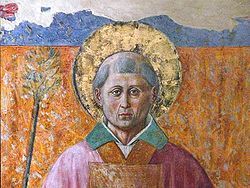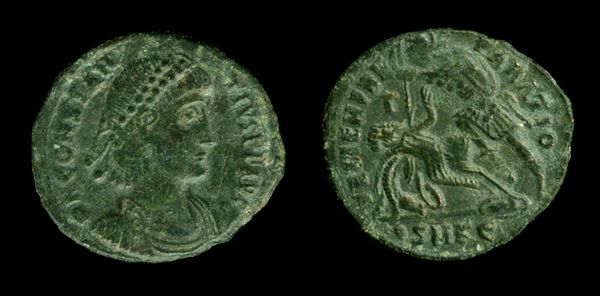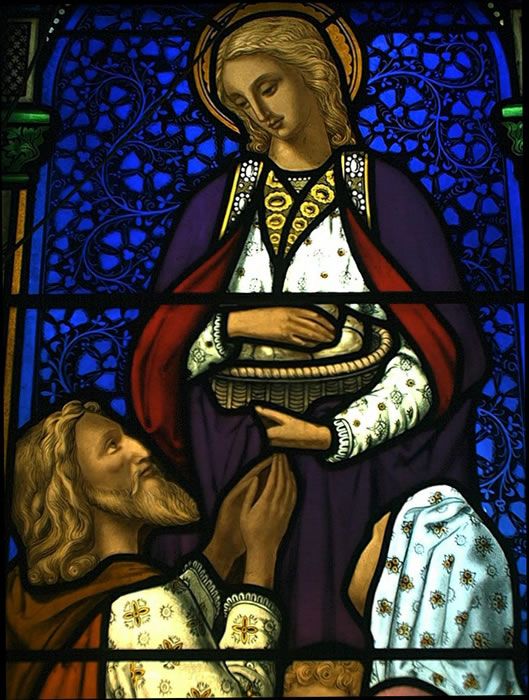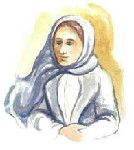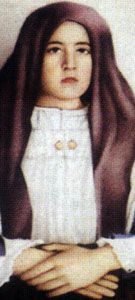Today, June 1, we celebrate the feast day of Saint
Fortunatus of Spoleto (also known as Saint Fortunatus of Territet, fourth
century). As described in the Roman
Martyrology, “At Montefalco in Umbria, Saint Fortunatus, a priest renowned for his
virtues and his miracles.”
The Acts of Saint Fortunatus were recorded in the seventh century, by a
priest named Audelaus, based upon the verbal account of a venerable priest
named Firmino. According to this
record, Fortunatus was a priest of the church of Turrita, near the Umbrian town
of Montefalco, Italy. He was a
caretaker for the many valuables of the Church—specifially, the poor, and he
brought them the deepest and most profound mysteries of the Church alongside
the charity that he was keen to offer them in Jesus' name.
Although he was a priest, this offered him barely enough money to live
upon, and so as well as tending to his priestly flock, Saint Fortunatus is
remembered for also working as a farmer, living off the land he tilled, and sharing
all he could tend and raise with those in need. He is frequently described as driving cattle with a small stick,
stopping to distribute all he owned the poor.
One particular legend recounts how while tilling the earth one day,
Saint Fortunatus discovered two dull coins, seemingly worth very little. Thanking God, and slipping the coins in his
pocket, he continued his work until sunset, certain and confident that the Lord
would inspire him as to how to use the newly discovered currency. As the sun set, Saint Fortunatus began
driving his cattle home. Upon the road,
the saintly man met a poor beggar, and reaching into his pocket discovered that
the dull coins had been transformed into radiant gold. Rather than keep the coins, he quickly gave
them away to the beggar, overcoming his own avarice. In this manner, Saint Fortunatus demonstrates how to overcome
greed, converting wealth and desire into love for those in need.
Upon his death, it is said that he was buried in a field called the
“Agellus,” which he had frequently tended.
The rod that he had used to dive his oxen miraculously flowered and grew
into a majestic tree, when stuck into the ground following his death. He is often depicted holding a rod which
appears to be flowering at its tip.
It is said that 20 years following the death of Saint Fortunatus, Saint
Severus stopped at his grave en route to Ravenna where he was to stand
trial. Praying for the intercession of
the saint, he was acquitted and returned to build a church on the spot of
Fortunatus’ burial. The church was
consecrated on August 8, 422, by Bishop Spes of Spoleto, and the relics of the
saint were translated to its altar.
While we know little about the life of Saint Fortunatus, we recognize
in him the calling to the path of service that the Lord provided, and the
refinement of his own sins through the grace of God and practice of
charity. We look to Saint Fortuantus as
a reminder and inspiration that we, too, are called to share what we have with
those in need, that regardless of our current struggles, there are those in worse
situations, and that through our charitable works, we radiate the love of God
on earth for all to see.
We pray, today, for the inspiration of Saint Fortuatus, that we may
live lives of charity and love for all we encounter.
Our Catholic Act of Charity
O my God, I love you above all things with my whole heart and soul
because you are all good and worthy of all my love.
I love my neighbor as myself for the love of you.
I forgive all who have injured me and ask pardon of all whom I have injured. Amen.
I love my neighbor as myself for the love of you.
I forgive all who have injured me and ask pardon of all whom I have injured. Amen.
Prayer for Selflessness
O Dearly beloved Word of God, teach me to be generous, to serve Thee as
Thou dost deserve, to give without counting the cost, to fight without fretting
at my wounds, to labor without seeking rest, to spend myself without looking
for any reward other than that of knowing that I do Thy holy will. Amen.
Prayer for Charitable Heart
O my Jesus, Thou who art very Love,
enkindle in my heart that Divine Fire
which consumes the Saints and transforms them into Thee.
O Lord our God,
we offer Thee our hearts
united in the strongest and most sincere love of brotherhood;
we pray that Jesus in the Blessed Sacrament
may be the daily food of our souls and bodies;
that Jesus may be established as the center of our affections,
even as He was for Mary and Joseph.
Finally, O Lord, may sin never disturb our union on earth;
and may we be eternally united in heaven with Thee
and Mary and Joseph and with all Thy Saints.
Amen.







